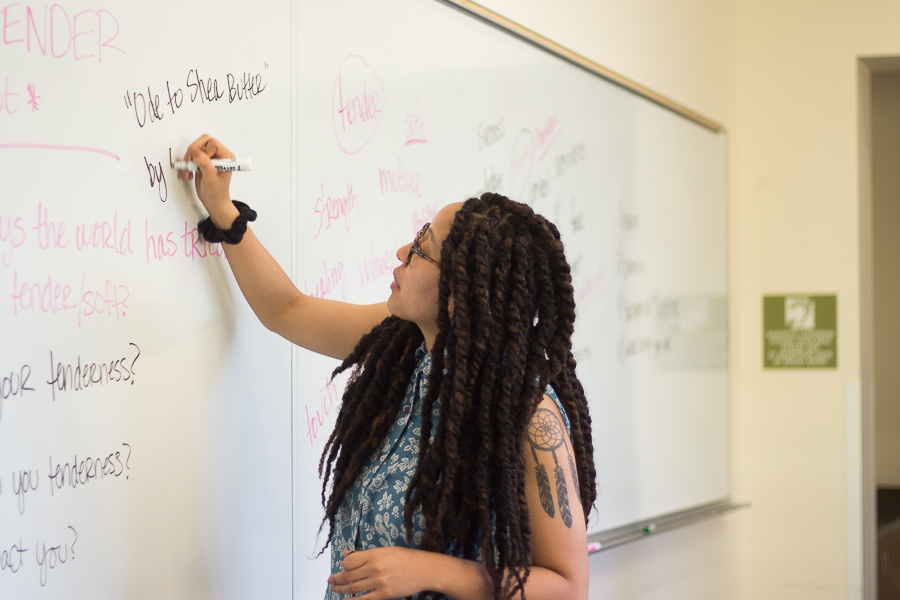
Workshop celebrating power in tenderness hosted at Cross Cultural Center
On Tuesday, May 8, the Cross Cultural Center hosted “Radically Tender,” a writing workshop led by poet Ariana Brown.
According to her online biography, Brown is a “Black Mexican American poet from San Antonio, Texas, with a B.A. in African Diaspora Studies and Mexican American Studies from the University of Texas, Austin.” She received “two Academy of American Poets Prizes” and is “a 2014 collegiate national poetry slam champion.”’
“I’ve been writing for as long as I can remember, but as of now, I am a poet,” Brown said. “I try not to limit the way I define that, but I’ve done slam [poetry] for a really long time and spoken word as well.”
Brown was invited to facilitate a writing workshop by members of the CCC last month. Initially, Brown was asked to teach a workshop she currently offers titled “Phenomenal Woman.”
“[Phenomenal Woman] is specifically about womanhood, but they asked me to make it more inclusive so that folks who are non-binary and genderqueer would also feel comfortable and accounted for in the space,” Brown said. “At that point, I, of course, was willing to make the accommodations. But I was looking at the curriculum and I thought that workshop in particular was intended to be specifically about womanhood, and I think that there should be spaces for that to happen.”
After thinking over how to make a more accessible writing workshop, Brown came up with “Radically Tender.”
“I think that what would be more useful in this space that everyone can be included in is a workshop on tenderness,” Brown said. “I think that […] people who are not men, we don’t have a lot of spaces to talk about tenderness — especially spaces in which we can think about how we can be tender to ourselves and people who are not the men in our lives.”
The flyer for the event, sent to the Middle Eastern and South Asian listserv and shared widely on Facebook, described the workshop as follows: “Embracing our own softness can feel impossible in a world which tells us we must develop hardness in order to survive. How can we allow ourselves to find the power in tenderness, in softness? This workshop explores the capabilities of tenderness, focusing on self-care and communal care, through writing exercises and group dialogue.”
The workshop began with standard introductions in addition to the questions: “What is your background with writing?” and “What brings you here today?”
Students, led in discussion by Brown, began with a discussion of various words and descriptives typically associated with the terms “power” and “tender.”
Continuing the discussion, Brown introduced the group to the Five Love Languages: quality time, physical touch, acts of giving or service, gift giving and words of affirmation. The Love Languages are a concept introduced in a book titled “The Five Love Languages,” written by Gary Chapman. According to Chapman, these languages are said to be the five ways humankind expresses and experiences love. Brown asked the group to relate these languages to tenderness and list ways that each student displays tenderness to the people around them and then how they display tenderness to themselves.
After, Brown introduced two writing prompts for the rest of the one-hour session: “What are some ways the world has tried to keep you from being tender/soft?” and “How do you maintain your tenderness? Who has shown you tenderness, how and what impact did it have on you?” Responses to these prompts ranged from bulleted thoughts to rough drafts of slam poems; later, the discussion spanned topics including relationships, prejudice, stereotypes and even full slam-style poetry.
“One of the things that was useful [from the discussion during workshop] was the observations […] about the different types of love that you receive in friendships versus […] in familial relationships,” Brown said. “I’ve been thinking a lot about expectations, just in general, and how that can be not great. I think with family I often have to readjust my expectations so that I’m not hurt.”
Brown concluded the workshop with a small assignment, asking the people in the group to make a list of additional ways they could show tenderness to themselves.
To students who weren’t able to make it to the workshop or didn’t know about it, Brown asked that they try to make some time for themselves.
“If they can’t take an hour to come to a workshop, then I would challenge them to, in their day-to-day, try and find a moment in which they can […] provide tenderness to themselves,” Brown said.
“I know this is [an] especially busy time in the quarter for people,” Brown said. “So I think it’s even more important as the school year is winding down and everything is becoming a little less hectic that people take time to reflect and sort of turn inward and make sure that they’re doing okay internally, that they have time and space and energy to process everything that might have happened during the most busy part of their lives and have patience with themselves to sit in the quietness.”
Written by: Priyanka Shreedar — campus@theaggie.org



